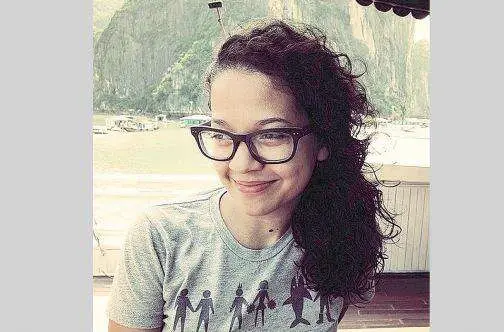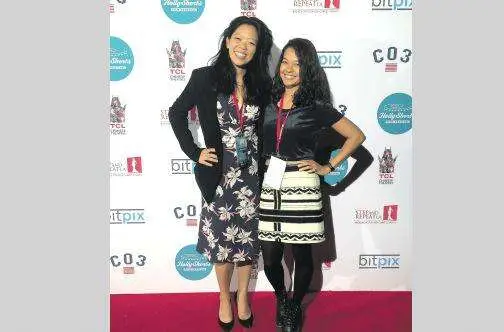
Film Chat
When I was young, I was very shy, and perhaps as a result I developed an early interest in drawing. I was developing a visual language — a way to communicate without speaking. By the time I was about 13, I was no longer shy but I had a real interest in pursuing art. I took courses in painting outside of school and worked on my visual portfolio. I was lucky enough to get into a boarding school with a strong art department. I was terribly homesick that first year away, but I threw myself into learning and practising and visiting museums and galleries.
I think my interest in film came about because it was the next phase of my visual storytelling. It wasn’t until I went to Chicago that I began to watch films that resonated with me on an artistic level. I was accepted at the School of the Art Institute of Chicago based on my painting portfolio, but once I arrived I began gravitating towards the film department. Before I knew it, I had loaded my curriculum with as many film production courses as possible. Film challenged me in new and exciting ways. I was fascinated by all aspects of production. I enjoyed cinematography and storyboarding just as much as I loved learning about cameras and film. It was overwhelming — I knew I couldn’t be the entire film production! Luckily, I discovered that I could funnel all of my passion for film-making into the screenplay.
Screenwriter Dominique Holmes chats with Jamaican Film Commissioner Renee Robinson about breaking into Hollywood and film in Jamaica.
Over the past year, Dominique Holmes has made major inroads into Hollywood, securing a literary manager and meetings at top network and cable companies. Her TV pilot script, Bog Walk, which follows a Jamaican preacher as he struggles to support his two teenage daughters, was recently selected by AMC as one of five finalists at the Austin Film Festival, which received a total of 9,100 submissions this year. Bog Walk won WeScreenplay’s Diverse Voices competition and was a finalist at ScreenCraft’s Pilot Launch Competition and the Nashville Film Festival.
Renee Robinson has had a busy first year as Jamaica’s new film commissioner. This year JAMPRO partnered with the Jamaica Film & Television Association (JAFTA) in launching the first successful Propella programme, which facilitated the production of five carefully selected short films by talented Jamaican film-makers. The Propella programme included talent discovery, capacity building in script consultation and festival strategy, content creation funded by the CHASE Fund, and finally, market attendance. Robinson led a delegation of film industry professionals first to the Toronto International Film Festival and then to the Trinidad + Tobago Film Festival, where the short films of Propella had their world premiere. Propella is the first of many new opportunities available to Jamaican film-makers, thanks to Robinson and her collaboration with JAFTA.
Renee Robinson (RR): Lovely to see you again, and congratulations on your recent successes! How did your interest in screenwriting come about?
Dominique A Holmes (DH): Thank you, it’s great to see you again! I first became interested in screenwriting while I was studying painting and film-making at the School of the Art Institute of Chicago. It was a wildly experimental programme. My thesis project was an optically printed hand-painted 16 mm film! Still, I wanted to make narrative films. At the time, I loved
The Spirit of the Beehive by VÃctor Erice and Ingmar Bergman’s
Through a Glass Darkly — quiet films with strong visuals and even stronger characters. I took a course in screenwriting to reverse my approach to screenwriting by putting story first as opposed to visuals first.
You’ve travelled extensively since you last lived in Kingston, Renée What’s it like to come back now that you have an outsider’s perspective? Were there any unforeseen challenges or pleasant surprises awaiting your return?
RR: It’s always a transition moving internationally and although I have done a lot of work relocation throughout my career, it doesn’t get any easier. It’s good to be home, however, and I have always said that the next time I came home it would be because I was the film commissioner of Jamaica. Maybe I thought it into being! My work has taken me from the private sector to NGOs to public sector, and all with different sizes and scope of organisations. This type of broad experience has really helped me to bring that big picture vision to our burgeoning industry, including seeing and understanding the challenges and the opportunities.
Has living abroad changed the way you write?
DH: Travel really opened my eyes to what makes Jamaica unique. I wrote
Bog Walk after living in Singapore for two years. Everything feels a little different after a long time away. When I returned to the island, I remember the home I grew up in feeling strangely askew, as if the angles didn’t quite match up to my memory. That heightened awareness helped focus the writing of
Bog Walk. It would have been a very different script if I had never had the opportunity to travel and stretch myself and experience different cultures and ways of living.
RR: Do you recommend studying screenwriting, or learning on the job?
DH: It really depends on what kind of learner you are. I learn through practice, and I’m grateful to have had the opportunity to spend two years studying dramatic writing at NYU Tisch School of the Arts Asia. It’s a bit like writing with training wheels. Screenwriting is an art form, but it’s also a profession. At a certain point, the training wheels have to come off and you have to find work. It’s certainly possible to learn on the job, but trying to get hired as a screenwriter is very competitive and having the credibility and network that formal education provides is very helpful. For me, having constructive criticism throughout the learning process was extremely valuable. It’s impossible for me to improve without knowing where I’m falling short.
What kind of educational programnes do you think would most help cultivate the next generation of Jamaican film-makers?
RR: I, too, am of two minds on that. On the one hand, it is vital for filmmakers to be formally trained in the technicalities of the craft, in developing visual literacy, and in critical appreciation of the art that came before. For that, one has to go to film school. It is also that accreditation from a reputable institution that opens doors for emerging professionals for jobs and networking. But at the same time, the hands-on knowledge of the production process is what keeps the industry running smoothly, and as we all know, time is money, so it is imperative that film professionals understand the workflow of the industry. The other key mindset to cultivate is one that understands the global business of the industry — including things like media consolidation, digital disruption, and transmedia trends. Film-makers need to keep themselves informed of trade news and policy and legislation, as these components often have greater impact of production than one might imagine at the outset.
DH: I agree completely. What are some of the key reasons foreign film and TV producers should consider shooting in Jamaica?
RR: Foreign professionals come to shoot in Jamaica for the sheer beauty and legacy of the island’s cultural identity, but also because our production crews are world-class and well-equipped. We’ve been lagging behind competitively in the region, however, due to our outdated tax schemes and we are finding that many other Caribbean locations are providing greater incentive to encourage service productions and can deliver a similar shoot landscape. One of the priorities for me, however, is the advancement of the local content development ecosystem — so that we are not just branding ourselves as a destination for others to come to film, but that we are actively producing and exporting our own indigenous content and generating international opportunities for our talent. There are a few key building blocks that will be necessary for this to be possible — including a local content production fund, investor tax credits to de-risk finance support of the film industry, and an exhibition quota system to reserve screen time for local content with local exhibitors and broadcasters.
DH: You were instrumental in leading Jamaican film-makers to some top festivals. Do you have any advice for film-makers looking to make the most of their festival experiences?
RR: Attending film festivals is not fun and games. This is where the industry conducts its business and where deals are made, so filmmakers need to be prepared to talk shop. At major festivals, you really do accidentally end up in an elevator with players who can change your career. Read the trades —
Variety,
Screen Daily,
Hollywood Reporter, and
Deadline. This is how you keep abreast of the deals that are being made, which will give insight on how buyers are making their decisions. Prepare by analysing the delegates’ list and sending intro e-mails requesting a meeting while at the festival — but remember that you must have a reason to do this outreach, as industry leaders get a lot of e-mails! And finally, do your research on the festivals themselves — some festivals are focused on emerging talent and offer immersion programmes, others are focused on public sales of tickets, and others still are purely for industry studio deal-making. Do your research and prepare rigorously.
DH: Great advice! It’s been lovely chatting with you. Thanks, Renée!
RR: Thanks, Dominique! And all the best with
Bog Walk! We’re proud of you!
Editor’s Note:
Dominique Holmes was born in Kingston, Jamaica, where she was raised by her Jamaican father (Oliver Holmes) and Trinidadian mother (Dayle
Dopson Holmes)


























